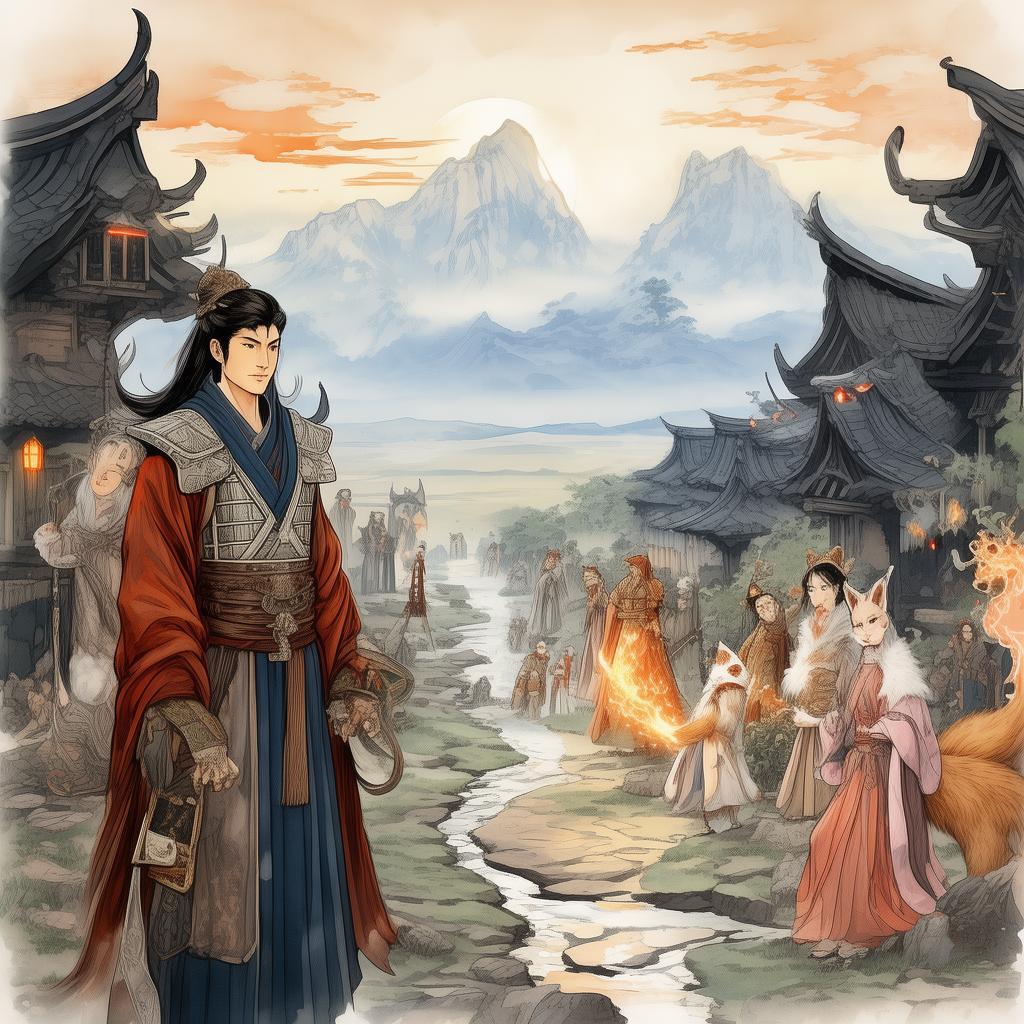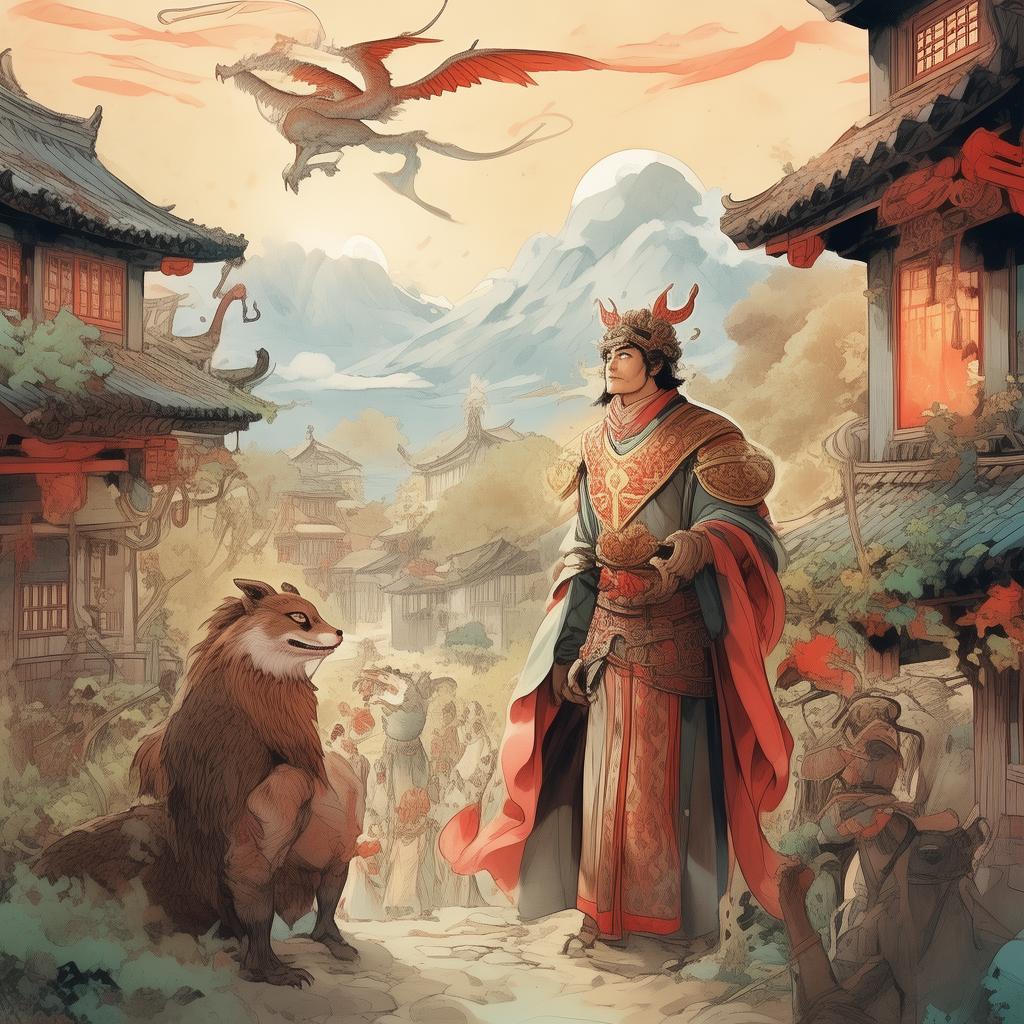Whispers in the Bamboo Grove: The Dance of Xiang Zhuang
In the heart of the lush, ancient mountains of Guangxi, there lay a village shrouded in mystery and whispered tales. The village was named Longjia, and its inhabitants were known for their peculiar customs, most notably the Xiang Zhuang dance, a ritual performed every Mid-Autumn Festival. It was said that the dance brought prosperity and protection to the village, but few knew its true origins.
In the year of the Fire Dragon, a young girl named Ling was born into the village. Her parents, who were both dancers, believed that she would carry on the family tradition. However, Ling was not like the other children of Longjia. She was curious, adventurous, and had a knack for uncovering hidden truths.
As the years passed, Ling grew up and became an excellent dancer herself. But something always gnawed at her: the enigmatic nature of the Xiang Zhuang dance. No one in the village would speak of its origins, and the elders would grow silent whenever the topic was mentioned.
One Mid-Autumn Festival, as the moon hung high in the sky, the villagers gathered in the bamboo grove. The air was thick with anticipation, and the music began to play, a haunting melody that seemed to come from the very earth itself. Ling, along with the rest of the young dancers, prepared to perform the dance.
As the music swelled, Ling stepped forward. She moved with grace and precision, her eyes closed, as if in a deep trance. The villagers watched in awe, their faces reflecting a mixture of reverence and fear. But something was different this year. Ling felt a strange sensation, as if the dance was not just a performance but a connection to something ancient and powerful.
After the dance, as the villagers dispersed, Ling felt compelled to seek out her parents. She found them in the old, abandoned temple at the edge of the village, a place that no one dared to enter. The temple was dark and musty, and as Ling pushed open the creaking door, a chill ran down her spine.
Her parents were hunched over an ancient scroll, their faces illuminated by the flickering candlelight. When they saw Ling, they exchanged a look of concern before whispering something to each other. They motioned for Ling to join them, and she approached cautiously.
The scroll was covered in strange characters, and as her parents began to read aloud, Ling's heart raced. "The Xiang Zhuang dance," her father began, "is not just a performance. It is a ritual that binds the living to the spirits of our ancestors. The dance is a sacrifice, a trade-off for our village's prosperity."
Ling's eyes widened in shock. "A sacrifice?"
Her mother nodded, her voice trembling. "Yes, Ling. Every Mid-Autumn Festival, we dance to appease the spirits, but we must also offer a life. This year, it is your destiny."
Ling's world shattered. She had always believed that the dance was a celebration, not a sacrifice. She turned to leave, her mind reeling, but her parents grabbed her arms.
"No, Ling," her father said. "You must understand. The balance must be maintained. If we do not offer a life, the spirits will take more than just one life. They will take everything."

Ling's heart was heavy with sorrow and disbelief. She had been chosen to be the sacrifice, the living sacrifice for the village's prosperity. She couldn't bear the thought of her parents' sacrifice, and she knew she had to do something.
That night, as the villagers celebrated, Ling crept back to the temple. She found an old, forgotten book that contained a spell, a spell that could break the bond between the living and the spirits. She whispered the spell, her voice trembling with fear, but the words came out clear and strong.
The temple shook, and the spirits were freed. The villagers awoke the next morning to find the temple in ruins, and the Xiang Zhuang dance forgotten. The spirits had left Longjia, and with them, the prosperity.
Ling's parents were beside her, their faces etched with lines of sorrow. "We did what we had to do," her father said. "But now, we must rebuild."
The village began to rebuild, and with it, the Xiang Zhuang dance. But it was different now, a dance of gratitude and remembrance, not sacrifice. Ling became the guardian of the village's history, ensuring that the truth of the Xiang Zhuang dance would never be forgotten.
And so, the moral paradox of Longjia was revealed: the dance of the bad in the good's paradise was a lesson in balance, a reminder that sometimes, for the greater good, sacrifices must be made. But it was also a story of hope, of a young girl who had the courage to challenge tradition and change the course of her village's destiny.
✨ Original Statement ✨
All articles published on this website (including but not limited to text, images, videos, and other content) are original or authorized for reposting and are protected by relevant laws. Without the explicit written permission of this website, no individual or organization may copy, modify, repost, or use the content for commercial purposes.
If you need to quote or cooperate, please contact this site for authorization. We reserve the right to pursue legal responsibility for any unauthorized use.
Hereby declared.









